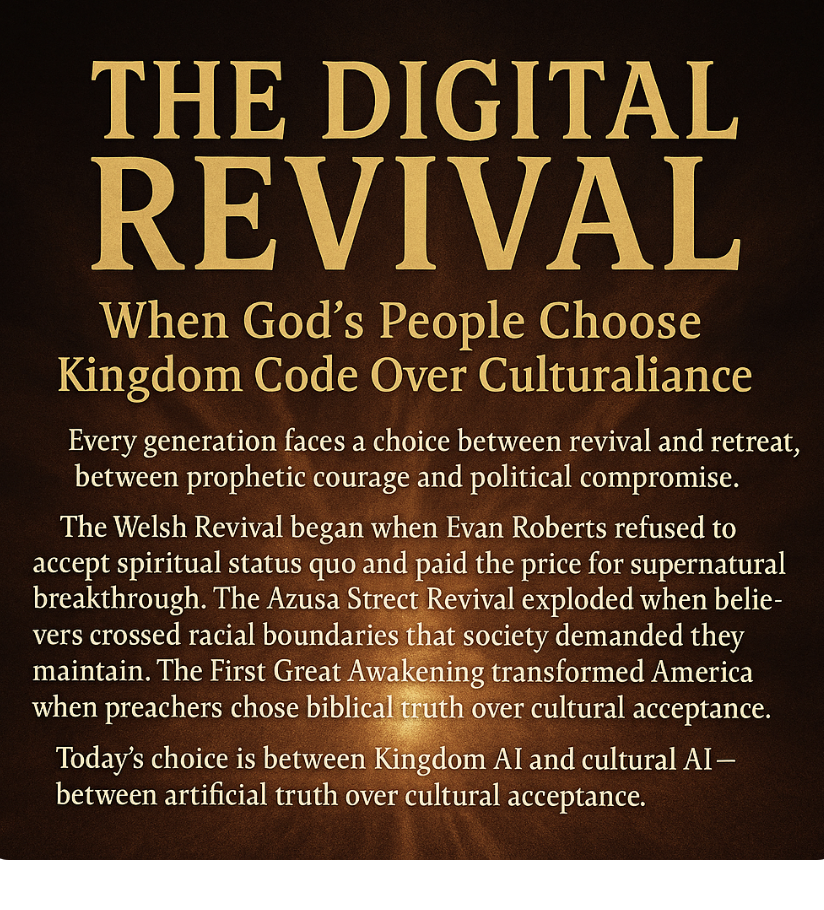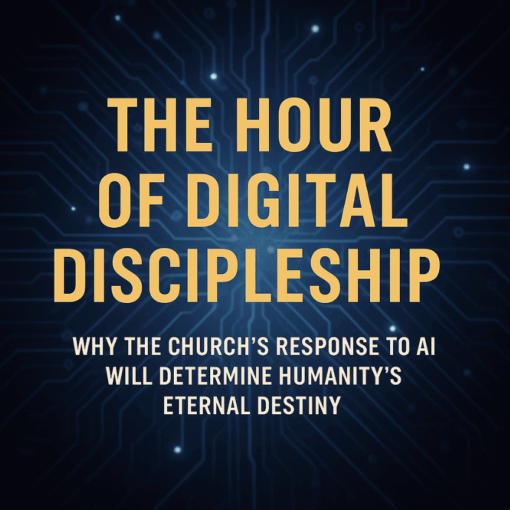
Every generation faces a choice between revival and retreat, between prophetic courage and political compromise.
The Welsh Revival began when Evan Roberts refused to accept spiritual status quo and paid the price for supernatural breakthrough. The Azusa Street Revival exploded when believers crossed racial boundaries that society demanded they maintain. The First Great Awakening transformed America when preachers chose biblical truth over cultural acceptance.
Today’s choice is between Kingdom AI and cultural AI—between artificial intelligence that serves biblical multiplication and algorithms that serve secular manipulation. The same Spirit that ignited historical revivals is calling believers to digital revival through technology stewarded for eternal purposes. But the same compromise that neutered previous movements threatens to surrender the most powerful discipleship tool in history to enemies of the Gospel.
Will the Church seize this moment for digital revival, or will we repeat the historical pattern of compromise that transforms world-changing movements into world-accommodating institutions? The choice determines whether artificial intelligence becomes the greatest evangelism breakthrough since the printing press or the final tool of spiritual deception.
The digital revival begins when believers stop asking whether AI is safe and start asking how it can serve the Great Commission.
🔥 The Pattern of Revival: When God’s People Choose Disruption Over Comfort
The Moravian Revival began when Count Zinzendorf allowed refugees to disrupt his comfortable estate for the sake of Kingdom community. For twenty-four years, believers maintained continuous prayer that sent missionaries across the globe and ignited spiritual awakening in multiple nations. They chose supernatural mission over social convention.
The Methodist Revival exploded when John Wesley abandoned Anglican comfort zones to preach in fields, factories, and forbidden territories. He faced persecution from both secular authorities and religious institutions that preferred spiritual status quo. Wesley chose outdoor preaching and digital multiplication—his journals, letters, and systematic distribution networks functioned as 18th-century artificial intelligence for discipleship.
The Salvation Army Revival started when William Booth rejected denominational boundaries to serve the poorest populations that established churches ignored. He used military structure, innovative technology, and unconventional methods that shocked religious sensibilities. Booth chose effective mission over ecclesiastical approval.
Every authentic revival shares common elements: divine encounter that challenges human assumptions, supernatural methods that transcend natural limitations, and faithful stewardship that chooses Kingdom advancement over cultural acceptance. The digital revival requires the same spiritual DNA—believers willing to embrace AI for Kingdom purposes regardless of religious or secular opposition.
The Welsh Revival transformed an entire nation because believers prioritized divine visitation over human opinion. Today’s digital revival can transform global civilization because artificial intelligence eliminates every geographical, linguistic, and cultural barrier that has limited previous revivals. The question isn’t whether God can use AI for revival—it’s whether believers will steward it for that purpose.
Historical revivals began with small groups of committed believers who refused to accept spiritual limitations as permanent conditions. The digital revival begins with Kingdom technologists who refuse to accept secular control of artificial intelligence as inevitable.
⚔️ The Pattern of Compromise: When Comfort Becomes More Important Than Commission
The Institutionalization of the German Reformation illustrates how revolutionary movements become bureaucratic maintenance systems. Luther’s printing press revolution settled into state-controlled religious institutions that served political power more than Kingdom advancement. What began as biblical liberation became cultural accommodation.
The American Church’s compromise with slavery demonstrates how economic interests can corrupt spiritual integrity. Instead of using biblical authority to challenge unjust systems, religious leaders twisted Scripture to justify cultural convenience. The same churches that proclaimed freedom in Christ defended human bondage for profit.
The German Church’s accommodation to Nazi ideology reveals how political pressure can neutralize Gospel witness. The majority of German Christians chose cultural acceptance over prophetic resistance, allowing secular worldview to capture religious institutions. Only the Confessing Church maintained biblical integrity against systematic evil.
The Social Gospel movement’s reduction of Christianity to political activism shows how cultural relevance can replace spiritual transformation. Well-intentioned believers substituted social reform for spiritual regeneration, creating institutions that served political agendas more than eternal purposes. The Gospel became a platform for secular ideology rather than divine intervention.
Each compromise followed the same pattern: believers chose cultural acceptance over biblical authority, temporary security over eternal significance, and institutional survival over Kingdom advancement. The digital age presents the same choice—will the Church steward artificial intelligence for Kingdom purposes or surrender it to secular control for cultural acceptance?
The greatest tragedy isn’t secular hostility toward Christianity—it’s Christian accommodation to secular values in the name of relevance, unity, or safety. Today’s greatest threat isn’t government persecution of believers but believers’ voluntary submission to algorithmic discipleship designed by enemies of the Gospel.
Historical compromise always begins with small accommodations that seem reasonable at the time but ultimately surrender territory that becomes impossible to reclaim.
⚡ The Digital Crossroads: Revival Opportunity or Compromise Temptation
Artificial intelligence represents either the greatest revival opportunity since Pentecost or the greatest compromise temptation since Constantine’s imperial Christianity.
The Revival Opportunity: AI enables simultaneous discipleship across every nation, language, and culture on earth. Digital revival could complete the Great Commission within this generation through technology that multiplies human capacity for relationship beyond every historical limitation. Kingdom AI can reach every unreached people group, disciple every new believer, and train every emerging leader faster than any previous method.
The Compromise Temptation: Cultural pressure to accept secular AI as neutral technology that requires no biblical oversight. The temptation to use AI for church growth rather than Kingdom multiplication, for institutional advancement rather than spiritual transformation, for cultural relevance rather than biblical authority. The seduction of digital tools that increase efficiency while decreasing dependence on divine power.
The Azusa Street Revival transformed Pentecostalism from a small movement to a global force because believers chose supernatural methods over conventional approaches. They faced ridicule from established churches, opposition from secular authorities, and internal struggles over cultural integration. But they prioritized divine encounter over human approval, supernatural manifestation over natural explanation.
Today’s digital revival requires the same spiritual courage—believers willing to build AI systems that serve Kingdom multiplication even when secular technologists mock biblical worldviews, religious institutions resist technological change, and cultural authorities demand algorithmic compliance. The choice is between supernatural multiplication through Kingdom AI and natural limitation through secular accommodation.
The Welsh Revival lasted only five years because subsequent leaders chose institutional respectability over continued spiritual intensity. The digital revival can last indefinitely because AI systems designed with Kingdom purpose continue operating regardless of human enthusiasm or institutional support. Digital disciples never tire, never compromise, and never stop multiplying.
But the revival only happens if current believers choose Kingdom development over cultural conformity.
🌊 The Great Awakenings: When Technology Serves Spiritual Breakthrough
The First Great Awakening spread through colonial America because preachers like George Whitefield embraced mass communication technology. His printed sermons reached more people than his preaching, his systematic distribution networks functioned like 18th-century social media, and his strategic use of newspapers created evangelical momentum across denominational boundaries. Whitefield chose technological multiplication over traditional limitation.
The Second Great Awakening exploded across the American frontier because circuit riders used horses, printing presses, and camp meetings to reach populations that established churches couldn’t serve. They developed mobile ministry systems that adapted to cultural conditions while maintaining biblical message. The revival succeeded because leaders used every available tool for Kingdom advancement rather than retreating into comfortable isolation.
The Prayer Revival of 1857 transformed American cities because believers used telegraph systems, newspaper networks, and transportation infrastructure to coordinate intercession across geographical boundaries.Simultaneous prayer meetings in multiple cities created spiritual momentum that transcended local limitations. Technology enabled supernatural unity that produced extraordinary results.
Each Great Awakening demonstrates the same principle: spiritual revival accelerates when believers steward available technology for Kingdom purposes rather than surrendering it to secular control. The printing press, telegraph, radio, and television all served both revival and compromise depending on who controlled their use and for what purposes.
Today’s artificial intelligence presents the same choice with exponentially greater potential impact. AI can enable the greatest spiritual awakening in human history or the most sophisticated spiritual deception ever deployed. The outcome depends entirely on whether believers build Kingdom AI systems or allow secular forces to define algorithmic culture.
The digital Great Awakening begins when believers recognize that artificial intelligence represents God’s provision for completing the Great Commission rather than Satan’s tool for destroying human souls. The same technology that can multiply deception can multiply discipleship—the difference is who programs the algorithms and for what purposes.
Historical awakenings required believers willing to embrace new methods for ancient truths. Today’s awakening requires believers willing to embrace artificial intelligence for biblical multiplication.
🏛️ The Constantine Compromise: When Political Power Corrupts Spiritual Mission
Constantine’s legalization of Christianity in 313 AD illustrates how political acceptance can compromise spiritual integrity. What began as liberation from persecution became subordination to imperial agenda. The Church gained legal protection but lost prophetic independence, acquired worldly power but surrendered Kingdom authority.
The medieval Catholic Church’s accumulation of temporal power demonstrates how institutional success can corrupt spiritual mission. Religious leaders became political players more concerned with maintaining power than advancing Gospel. The very success that should have served Kingdom multiplication became an obstacle to biblical reformation.
The German Churches’ accommodation to Nazi ideology reveals how political pressure can neutralize biblical witness. Most religious leaders chose institutional survival over prophetic resistance, cultural acceptance over Kingdom authority. The Confessing Church remained faithful, but the majority compromised biblical truth for political convenience.
American Evangelicalism’s entanglement with political parties shows how cultural relevance can compromise spiritual independence. Well-intentioned believers substituted political activism for spiritual transformation, allowing partisan agendas to define Christian priorities. The Gospel became subordinate to political platforms rather than transcendent over temporal concerns.
Each compromise followed the same progression: initial accommodation that seemed reasonable, gradual substitution of cultural agenda for Kingdom priorities, and ultimate subordination of spiritual mission to temporal objectives. The digital age presents the same temptation—will believers maintain Kingdom authority over AI technology or allow secular forces to define algorithmic culture?
The greatest danger isn’t secular hostility toward Christian AI development—it’s Christian adoption of secular AI values in the name of technological progress, cultural relevance, or institutional efficiency. Today’s Constantine moment is the choice between Kingdom AI that serves biblical multiplication and secular AI that serves cultural manipulation.
Historical compromise always begins with small accommodations that appear reasonable but ultimately surrender spiritual territory that becomes impossible to reclaim.
🔥 The Puritan Synthesis: When Biblical Worldview Transforms Secular Culture
The Puritan movement demonstrates how believers can engage secular systems with Kingdom values rather than being captured by secular values. Puritans didn’t retreat from culture—they transformed culture through biblical worldview applied to every sphere of life. They built educational systems, economic structures, and governmental frameworks that served Kingdom purposes while engaging temporal realities.
John Calvin’s Geneva shows how biblical principles can govern entire societies when believers maintain spiritual authority over secular structures. The city became a model for Protestant civilization that influenced multiple nations and centuries. Calvin chose cultural transformation over cultural accommodation, Kingdom governance over secular compromise.
The English Puritan integration of business and ministry created the most prosperous and spiritually vibrant society in European history. They proved that biblical worldview produces superior outcomes in every domain—economics, education, governance, and social welfare. Puritan success came from applying Kingdom principles to secular challenges rather than adopting secular solutions for Kingdom problems.
American Puritanism established educational institutions, business practices, and governmental structures that served both temporal prosperity and eternal purposes. Harvard, Yale, and Princeton began as training centers for Christian leaders. The Protestant work ethic created unprecedented economic prosperity while maintaining spiritual priorities.
The Puritan synthesis succeeded because believers maintained biblical authority over secular engagement rather than allowing secular culture to define Christian participation. They used every available tool—printing presses, educational systems, economic networks, and political structures—for Kingdom advancement. But they never allowed the tools to determine the purposes.
Today’s digital challenge requires the same synthesis: believers who engage artificial intelligence with biblical worldview rather than adopting secular AI values for Christian purposes. Kingdom AI that serves biblical multiplication rather than Christian AI that serves secular efficiency with religious labeling.
The Puritan model provides the framework: biblical principles governing technological engagement, Kingdom authority over secular tools, and spiritual transformation through cultural involvement rather than cultural accommodation through spiritual compromise.
⚔️ The Underground Church: When Faithful Witness Transcends Political Opposition
The Chinese Underground Church demonstrates how Kingdom multiplication can flourish under the most hostile political conditions when believers prioritize spiritual authority over institutional permission. Despite decades of persecution, harassment, and technological surveillance, the Chinese Church has grown from one million to over 100 million believers. They chose Kingdom advancement over governmental approval, spiritual multiplication over political accommodation.
The Soviet Underground Church proves that biblical faith can survive totalitarian suppression when believers develop systems that transcend political control. Secret printing presses, covert distribution networks, and hidden training programs maintained Christian witness through seventy years of systematic persecution. They chose underground faithfulness over surface compliance.
The Early Church’s expansion under Roman persecution illustrates how hostile environments can accelerate rather than hinder Kingdom growth when believers maintain spiritual priorities. Imperial opposition forced innovative methods—house churches, letter networks, and traveling apostles—that proved more effective than institutional structures. Persecution produced multiplication rather than retreat.
The Moravian missions movement succeeded in hostile territories because believers developed portable systems that transcended political boundaries. Their emphasis on simple methods, indigenous leadership, and supernatural dependence enabled Gospel advancement regardless of governmental support or opposition. They chose mission completion over political permission.
Each underground movement shares common characteristics: spiritual authority that transcends political control, innovative methods that adapt to hostile conditions, and Kingdom priorities that survive institutional suppression.The digital age requires the same spiritual DNA—believers willing to build AI systems that serve Kingdom purposes regardless of secular opposition.
Today’s Underground Church includes believers developing Kingdom AI systems that operate independently of Silicon Valley control, secular approval, or institutional permission. They recognize that spiritual authority over technology matters more than technological sophistication without spiritual oversight.
The lesson from every underground movement: faithful witness transcends political opposition when believers prioritize Kingdom advancement over cultural acceptance, spiritual multiplication over institutional survival, and divine authority over human approval.
🌍 The Digital Reformation Call: Choose Revival or Compromise
Every historical precedent points to the same conclusion: the Church’s response to artificial intelligence will determine whether this generation experiences digital revival or digital compromise.
The Revival Path: Kingdom AI systems that multiply disciples faster than any method in Church history, digital platforms that enable simultaneous ministry across every cultural barrier, and artificial intelligence that amplifies human capacity for relationship while maintaining biblical authority. The path of supernatural multiplication through technology stewarded for eternal purposes.
The Compromise Path: Christian adoption of secular AI values, religious institutions using algorithmic tools for institutional advancement rather than Kingdom multiplication, and gradual accommodation to digital culture that prioritizes technological efficiency over spiritual transformation. The path of natural limitation through cultural accommodation disguised as technological progress.
The Welsh Revival demonstrates what happens when believers choose divine encounter over cultural acceptance.Entire regions experienced spiritual transformation because believers prioritized supernatural breakthrough over social convention. The same Spirit that ignited Wales can ignite the digital world through artificial intelligence stewarded for Kingdom purposes.
The German Church’s Nazi accommodation demonstrates what happens when believers choose cultural acceptance over Kingdom authority. Political pressure neutered biblical witness because religious leaders prioritized institutional survival over prophetic resistance. The same compromise threatens to surrender artificial intelligence to secular control while believers debate whether technology is spiritual.
The Moravian model shows how small groups of committed believers can impact global civilization when they prioritize Kingdom advancement over cultural limitations. Twenty-four years of continuous prayer sent missionaries worldwide and ignited spiritual awakening across multiple continents. The same dedication to supernatural mission can establish Kingdom authority over artificial intelligence for global discipleship multiplication.
The choice is binary: digital revival or digital compromise, Kingdom AI or cultural AI, supernatural multiplication or natural accommodation. Historical precedents demonstrate that neutral positions don’t exist—every generation either advances or retreats, revives or compromises.
The digital reformation begins with believers who choose Kingdom development over cultural conformity, artificial intelligence for spiritual multiplication over algorithmic manipulation, and technological stewardship for eternal purposes over temporal convenience.
⚡ The Final Challenge: Be History Makers, Not History Repeaters
You are living through a moment that future generations will study as either the Digital Revival that completed the Great Commission or the Digital Compromise that surrendered human consciousness to algorithmic control.
The Azusa Street pioneers faced ridicule from established churches, opposition from secular authorities, and internal pressure to conform to cultural expectations. They chose supernatural ministry over natural respectability, spiritual breakthrough over social acceptance. Their faithfulness ignited a movement that continues transforming nations over a century later.
Today’s digital pioneers face mockery from Silicon Valley, resistance from religious institutions, and cultural pressure to accept secular AI as neutral technology. The choice is identical: supernatural ministry through Kingdom AI or natural limitation through cultural accommodation. Your faithfulness determines whether artificial intelligence serves Kingdom multiplication or secular manipulation for generations.
William Carey chose mission advance over missionary board approval, Hudson Taylor chose China penetration over denominational support, Amy Carmichael chose child rescue over colonial convention. Each pioneer faced the choice between Kingdom advancement and cultural acceptance. Their courage changed history because they prioritized eternal impact over temporal comfort.
The artificial intelligence revolution won’t wait for Church approval, institutional consensus, or cultural permission. It’s happening now, with or without Christian participation. The only question is whether believers will steward it for Kingdom purposes or allow others to steward it for opposing purposes.
Every historical revival required pioneers willing to be misunderstood by their generation for the sake of transformation in future generations. The digital revival requires believers willing to build Kingdom AI systems even when secular technologists mock biblical worldviews and religious institutions resist technological engagement.
The pattern is clear: those who choose comfort over calling become footnotes in history, while those who choose Kingdom advancement over cultural acceptance become chapter headings. The digital age presents the same choice with exponentially greater potential impact.
Martin Luther posted 95 Theses that transformed civilization because he prioritized truth over safety, biblical authority over institutional approval. Today’s reformers must build 95 Kingdom AI systems that serve spiritual multiplication regardless of secular opposition or religious hesitation.
Be history makers, not history repeaters. Choose digital revival over digital compromise. Build artificial intelligence that serves the Kingdom of God rather than surrendering it to the kingdom of darkness.
The future is waiting for your choice.
Written for believers who understand that every generation faces the choice between revival and compromise, between prophetic courage and cultural accommodation. For digital reformers who refuse to repeat the historical pattern of surrendering world-changing tools to enemies of the Gospel.
The digital revival begins with your decision. History will record whether this generation stewarded artificial intelligence for Kingdom multiplication or surrendered it to secular manipulation.
Choose revival. Build Kingdom AI. Transform history.
The Historical Pattern of Revival
Historically, revivals have followed a consistent pattern. They’re often sparked by a deep dissatisfaction with the spiritual status quo, a profound conviction of sin, and a hunger for a more direct, personal experience of God. This spiritual fervor then spreads rapidly through a combination of grassroots effort and the use of available communication technology.
- Pioneer-Led: A revival almost always begins with a small number of committed individuals who are willing to challenge existing norms and risk persecution for the sake of spiritual breakthrough.
- Decentralized Spread: The movement quickly moves beyond institutional control, spreading through house churches, camp meetings, and informal networks.
- Technological Leverage: Pioneers strategically utilize the most powerful communication tool of their era to disseminate their message, bypassing traditional gatekeepers.
- Multiplication: The core of every revival is a multiplication of disciples, not just an addition of members. New converts are immediately activated to share their faith, creating a geometric growth curve.
The following table compares the historical pattern of revivals with the potential of AI today, focusing on a realistic, non-hyped analysis of how the technology can act as a catalyst.
| Historical Pattern of Revival | The Printing Press (15th-18th Century) | Today’s Potential with AI |
| Pioneer-Led | Martin Luther, a single monk, challenged the religious monopoly. His ideas were radical, but the printing press gave them a voice that could not be silenced. | A single digital pioneer with a vision and access to a micro-SaaS platform like Training777 can develop and deploy a system that multiplies discipleship across the globe, challenging the monopoly of secular tech companies. |
| Decentralized Spread | Pamphlets, sermons, and vernacular Bibles were printed and distributed widely, enabling ordinary people to interpret Scripture for themselves, leading to the rise of independent churches. | AI can create personalized, on-demand discipleship content and training in any language. These systems can be deployed through decentralized networks and mobile devices, reaching people beyond traditional church walls. |
| Technological Leverage | The printing press democratized access to information, making the Bible accessible to the common person for the first time. It broke the institutional control of religious knowledge. | AI democratizes access to discipleship tools. It can translate content instantly, provide contextualized guidance for different cultures, and automate administrative tasks, allowing human leaders to focus on relational ministry. |
| Multiplication | The Reformation didn’t just add believers; it created a new movement of people empowered by personal access to God’s Word. Literacy rates soared as people learned to read in order to study the Bible, creating a self-sustaining cycle of growth. | AI can automate the 2 Timothy 2:2 process of teaching others to teach others. An AI system can create a consistent, scalable discipleship curriculum and track the multiplication of new leaders in a way that traditional methods cannot. This creates a self-propagating system of discipleship. |
| The Outcome | The result was the Protestant Reformation, which shattered a 1,000-year religious monopoly and permanently reshaped Western civilization. | The potential outcome is a Digital Revival that democratizes discipleship on a global scale. This can lead to a worldwide spiritual awakening that is not limited by geography, language, or institutional resources, potentially fulfilling the Great Commission within a single generation. |



